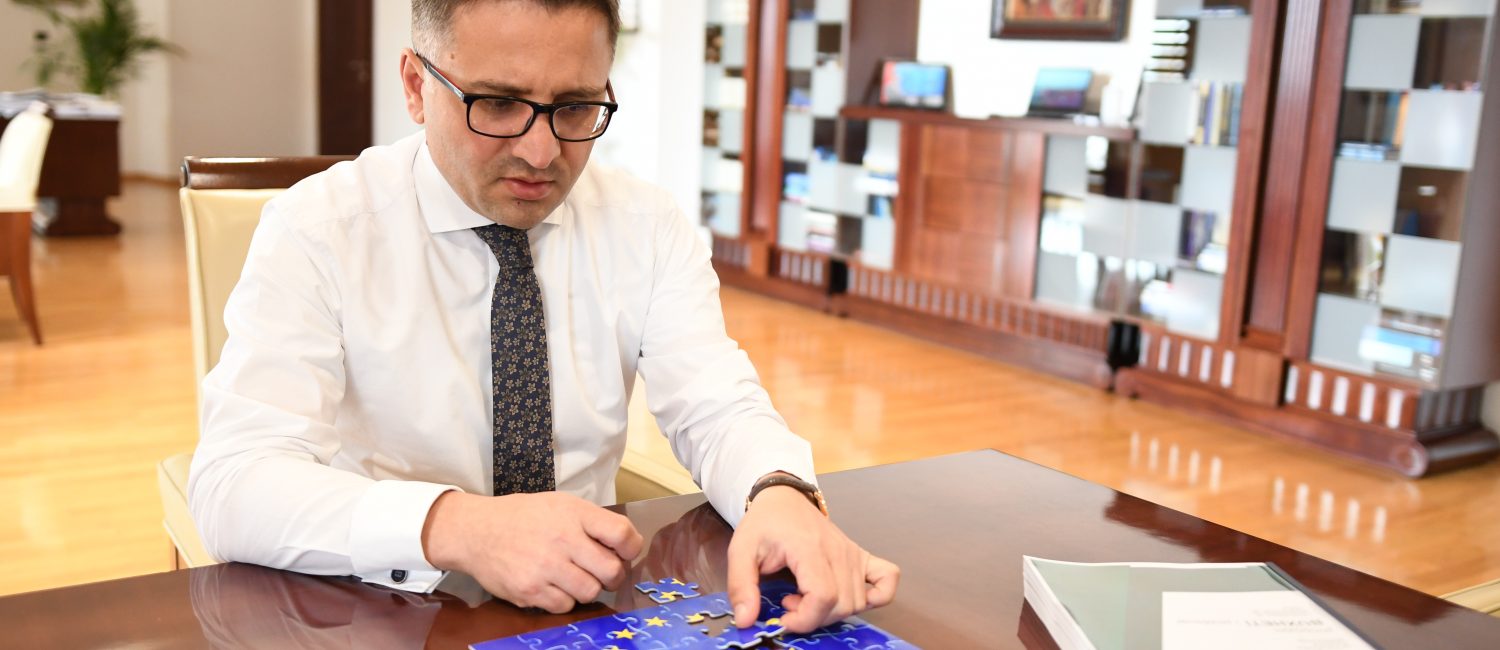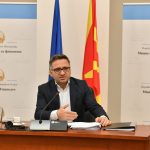13th May 2023, Skopje – “Europe will not be made at once, or according to a single plan. It will be built through concrete achievements, which first create a de facto solidarity” – as said by Robert Schuman, one of the European Union founders.
Last week, we celebrated the Day of Europe on 9th May – the day when the Schuman Declaration was published, which is considered to be the first step in building the European Union. Regular Annual Economic and Financial Dialogue between the EU and the Western Balkans and Türkiye, will take place in Brussels next week. Thereunder, the topics of discussion will cover fiscal policy, macroeconomic stability, boosting of the economic growth, job creation, structural reforms in support of recovery from the crisis, strengthening of the economic resilience, as well as social policy. This Dialogue is part of our preparatory activities as an EU candidate country, being annual coordination of the Member States, as regards the social and economic topics, as well as the harmonization of the economic and budget policies with the decisions made at an EU level. EU economic governance framework is a solid indicator of the cohesion and the multilateral approach in coordinating one of the most significant goals, that being the economic and social development, as well as the well-being of the EU citizens.
These two events were a reason enough for dedicating this column on the topic that has continuously been my inspiration over the years – EU membership and European future. This column will allow the readers to get not only a simplified, but also a complete picture of the process we are going through on our road to EU membership (by placing the focus on the economic reforms), what is ahead of us, as well as the benefits that await us when we become part of the European Union.
EU will be Built through Crises, and that it would be Sum of their Solutions
In times of several overlapping global economic crises, when policymakers are focused on cushioning the effects and strengthening the economic resilience, what should also be taken into account are the future prospects of the country and its economy, as I have repeatedly written – the so-called “big picture”, all to end of being mindful of the primary goals and the path to a better tomorrow. “Europe will be built through crises, and that it would be the sum of their solutions”, as one of the EU Founders, Jean Monnet said. Amid Russia’s invasion of Ukraine, as one of largest-scale and most dangerous military conflict since the Second World War onwards, the outlooks of many of the countries have been improved, also including the prospects for sooner integration of the Western Balkans in the EU. On the other hand, the few overlapping crises slow down the development of the economies, thus entailing further efforts for their convergence
Economic and Financial Dialogue with the EU is the proper means for attaining the European goals, as a preparation for both the membership and the European Semester. In fact, the European Semester itself was initially conceived as a yearly exercise, being further turned into a framework to coordinate economic and social policies of the Member States. Need to strengthen the common economic polices of the Member States and improve the coordination from the aspect of social policies, was particularly highlighted upon the global financial crisis in 2008. Member State realized that there was a need to improve the harmonization of the goals under the national budges, the policies for boosting growth, the employment and the social protection within the EU. Hence, the first cycle of the European Semester was carried out in 2011. European Semester objectives pertain to the Union convergence and stability, macroeconomic stability and growth support.
Close to joining the EU – Economic and Social Policy Coordination
In order to further improve the Union’s coordination with the potential new Member States, starting October 2013, a new approach called the European Semester Light was introduced in the Enlargement Strategy. Starting October 2014, Western Balkan countries and Türkiye were urged by the European Commission to strengthen their economic governance by preparing economic reform programmes.
Economic Reform Programme (ERP) is the most important strategic document in the economic dialogue with the EC. The document is prepared each year, being a solid preparation for taking part in the process of economic and fiscal surveillance of the EU Member States, i.e. inclusion in the European Semester process as regards the economic policy coordination within the EU. The Programme displays a medium-term framework of the macroeconomic and fiscal policy, as well as a detailed overview of the structural reforms in support of boosted competitiveness of the economy, as well as job creation. However, as per the rules of this process within the EC, Ministry of Finance is entrusted to coordinate the preparation of this document at Government level. Upon its submission to the EC, the Programme is reviewed with EC representatives within the Economic and Financial Dialogue with the EU Council, followed by endorsing the Joint Conclusions with recommendations for the respective country, which should be taken into account when preparing the next Economic Reform Programme.
2023-2025 ERP: Improving the Human Capital and Boosting the Competitiveness, Accompanied by Green Transformation
The 2023-2025 Economic Reform Programme was adopted by the Government of the Republic of North Macedonia on 1st February 2023, being officially submitted to the European Union on the same day.
Programme is prepared on the basis of the 2023-2027 Fiscal Strategy, the 2023-2027 medium-term budget framework, the national sector strategies, the regional strategies and documents, the green and digital agenda of the EU, as well as the Economic and Investment Plan of the EU for the Western Balkans.
The Programme also rests upon the recommendations in the EC Progress Report on North Macedonia, as of October 2022.
When discussing structural reforms and priorities under the reform agenda, the Economic Reform Programme is the most comprehensive document, providing for monitoring the implementation dynamics of the reforms until their final realization. Key challenges in the Programme, pertaining to boosting the competitiveness and ensuring sustainable and inclusive growth of our economy, are: 1) strengthening of human capital, 2) green transition and 3) improving the competitiveness of domestic enterprises, as well as their further integration into the global value chains, as well as formalisation of the economy. These goals also reflect the EC views about the prior both the developments and the Economic Programme, which implicate improving the quality and the relevance of the education system in support of increased employment, boosting the competitiveness of domestic companies, integrating into the global value chains and reducing the informal economy, as well as modernising the energy sector and transitioning to green energy.
Despite the few overlapping crises over the past years, the Government continued working on the reforms, which will get us closer to the desired goals – EU membership and general improvement of the society and the economy, as well as the performance thereof, i.e. providing EU-alike conditions in our country. As regards public finance, I would like to hereby underline the adoption of the new Organic Budget Law, under which the medium-term budgeting is introduced, while also putting a legal framework in place, pertaining to the Fiscal Council and the respective fiscal rues. Tax system reform has been launched, as being foreseen under the respective Strategy. This reform is based upon the tax base expansion concept by revising the tax expenditures and reducing the informal economy. Public Investment Management Department is established in the Ministry of Finance, with the harmonization of the wording in the draft Law on Public Private Partnership being in an advanced phase. From the aspect of digital transformation of the public sector, public finance digitalisation process is commenced, i.e. establishment of Integrated Financial Management Information System, Management Information System on State Aid and Integrated Tax Information System in the Public Revenue Office. Measures are also designed, while also undertaking activities aimed at improving the efficiency and the effectiveness of the public consumption, the fiscal discipline, the debt sustainability and the transparent public finance management.
Significant strategies, which should be adopted this year are the Smart Specialisation Strategy, 2023-2025 Strategy for Formalisation of the Informal Economy, as well as the 2030 Human Capital Development Strategy. 2023 Operational Plan on Active Employment Programmes and Measures and Labor Market Services was also prepared, and additional activities are being undertaken, aimed at improving the legal framework for the labour market, as well as improving the quality in the education and health system. At the same time, legal framework is also being prepared for establishing Energy Efficiency Fund, all to the end reducing the country’s susceptibility to external shocks and increasing the energy efficiency.
All aforementioned activities are aimed at meeting the goals set in line with the EU Joint Conclusions, all to the end of overcoming the key challenges and providing for sustainable economic recovery, as well as greater resilience of the economy and fiscal sustainability.
Bilateral Screening
In addition to improving the economy structure, countries’ convergence towards the European Union is also accomplished by harmonising the national legislation with the Acquis Communautaire, i.e. the rights and obligations, which unite the EU Member States. Political criteria are set, such as democracy, human rights and respect for and protection of minority population, proper functioning of the institutions, rule of law. Harmonisation is also required as regards the economic criteria, i.e. the functional market economy, the competitiveness and the macroeconomic stability. In brief, upon the accession, the new Member States should be fully prepared to adopt the joint goals and enforce the obligations within the EU. In addition, the criteria should be applied in the administrative structures, i.e. the candidate countries must build administrative capacities, which will be sufficiently efficient for implementing the harmonised legal framework.
Prior to launching the process of harmonisation of the EU candidate countries, a screening process is carried out, whereby the EC presents the entire legislation that should be transposed into the national one for each chapter separately, while the candidate country presents the ongoing developments therein. Upon preparing the Screening Report by the EC, chapter for negotiations are opened on the basis of a decision by the EU Council. During the negotiations, the country is given deadlines to adhere to so as to fully harmonise its legislation with the Acquis. Following the closing of the negotiations, date for full-fledged EU membership is determined.
As regards the clusters pertaining to public finance, around half of the respective areas/chapters have been subject to bilateral screening so far. Chapters, which were covered, pertain to macroeconomic stability, ability of the financial sector to target the savings on productive financing, public internal financial control, protection of the EU’s financial interests, protection of the euro against counterfeiting, capital movements and payments, prevention of money laundering, banks and financial institutions, insurance and pension insurance, securities markets, indirect and direct taxation, administrative cooperation and mutual assistance and operational capacity. To my great delight, most of the recommendations provided throughout the screening process, are being implemented, whereby some of them have already been implemented in the meantime. A great deal of obligations are a still ahead of us. EU membership is a major challenge. If fully dedicated, it will be overcome, thus reaping the valuable benefits it brings once becoming part of the EU family.
Economic and Non-Economic Benefits the EU Brings
I will briefly touch upon the benefits from the EU membership, for which I have considerably written previously, however, I will revisit this topic, all to the end of allowing the readers to get the whole picture thereof. European Union has always been primarily an economic alliance throughout the history. Economic and social well-being has always been the reason for integration, ever since the European Coal and Steel Community. It is one of the economic superpowers, with a market of over half a billion consumers and linked solid global value chains. For small economies (like ours), just gaining access to new consumers in the European Single Market is quite promising in view of growth acceleration. Accordingly, we can easily come to the conclusion that the economic benefits therefrom are abundant. Thus, I will actually classify the benefits in economic and non-economic ones.
As regards the economic benefits, I will primarily stress the increased living standard, as a positive impact of the EU membership. As per the carried out studies and analyzes of long-time series of statistical data, the impact of EU on the economy is estimated at additional 12% -20% of GDP per capita. As per certain studies, the effects of the European Single Market on trade and GDP is rated at approximately 10% of EU GDP in average. Improved business climate and progress as regards the structural reforms have also been recorded among the new Member States. Access to the European Funds, being available as we advance on our road to the EU, is yet another benefit. Total EU budget for the period 2021-2027 is estimated at around EUR 2,000 billion as funds aimed at supporting diverse areas of interest for the Member States. I would like to hereby underline that the support the EU extended to our country during the past 30 years, is estimated at over EUFR 3.3 billion (via grants and macro-financial support).
When talking about the non-economic benefits from the EU membership, we could forthwith highlight the strengthening of democracy and good governance – freedom of expression, political stability, regulation quality, effectiveness of governance, rule of law and corruption control. Moreover, many of the significant global issues in the EU are addressed in coordinated manner, which is particularly significant for a small economy as ours. This is illustrated with climate change and soil and water pollution, whereby the coordinated approach provides for increasing the efficiency and effectiveness of the joint actions compared to the steps taken by each of the nations separately. This also covers the joint fight against corruption, smuggling and prevention of money laundering, followed by the cross-border exchange of information, geared towards protecting the rights of both the citizens and the consumers. The last and most important is the security the EU offers, particularly in times of global safety challenges posed by hybrid attacks and geostrategic turmoil, bringing plenty of uncertainties.
Commitment and Determination for Gaining the European Perspective
We are strategically committed to the EU Membership, which will provide for improved prospects of our citizens, entailing a bright future for the present and the generations to come within the native country. However, this process is neither easy nor simple at all. It requires maximum dedication and patience, along with courage to make significant decisions. Just as we made bold decisions with the constitutional amendments prior to the NATO accession, the EU membership equally requires brave decisions about constitutional amendments, being part of the process for opening negotiations with the EU. However, much more work and efforts are needed in the negotiations until full-fledged EU membership.
In conclusion, I would like to revisit an observation I mentioned in another column published in 2015, on the Day of Europe, dedicated to European integration, while acting as Deputy Prime Minister for European Affairs. At the time, I underlined that we stand firmly by the idea that “the only option for us is to pursue the European agenda”, with duties we need to fulfill in order to become part of this Union, based on the values of human dignity, freedom, democracy, equality, rule of law and observance of human rights.
We all aim to bring Europe home.
















